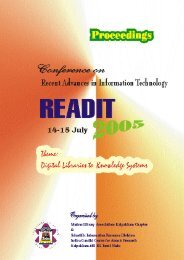READIT-2007 - Indira Gandhi Centre for Atomic Research
READIT-2007 - Indira Gandhi Centre for Atomic Research
READIT-2007 - Indira Gandhi Centre for Atomic Research
You also want an ePaper? Increase the reach of your titles
YUMPU automatically turns print PDFs into web optimized ePapers that Google loves.
Role of Libraries in the Knowledge Commodity World<br />
K V Satyanarayana*, Sheetal Tare *<br />
Abstract<br />
Libraries have been dealing with in<strong>for</strong>mation technology <strong>for</strong> nearly four decades and it has<br />
touched every aspect of library services, <strong>for</strong> example; circulation, reference, cataloging and so on. With the<br />
evolution of the Internet, the change is happening at a very rapid pace. Usages of online services have<br />
reached a frenetic pace. In<strong>for</strong>mation that was earlier available through books, journals in libraries or<br />
high-cost databases is now available on the Web, sometimes free of cost. This has led to commoditization of<br />
knowledge with in<strong>for</strong>mation available anywhere, anytime and barriers to access of knowledge have started<br />
disappearing. A small percentage of in<strong>for</strong>mation is freely available on the Web while there is still a vast<br />
pool of in<strong>for</strong>mation available with a price and the options <strong>for</strong> end-users have increased manifold. Indeed,<br />
users seem to be com<strong>for</strong>table searching the Web by using Google and other search engines, rather than<br />
visiting the library. This has created a paradigm shift <strong>for</strong> libraries. Libraries are now focusing on adding<br />
value by 1) Suggesting sources to users and providing remote access to library sources, 2) Providing<br />
assistance through evaluating authenticity, 3) Enhancing the quality of content <strong>for</strong> users and 4) Provide<br />
domain specific in<strong>for</strong>mation services.<br />
1. INTRODUCTION<br />
Today, knowledge is primary resource in organizations and society is moving<br />
from being in<strong>for</strong>mation society to knowledge society. Organizations are practicing and<br />
implementing knowledge management techniques and technologies to improve their<br />
efficiency, effectiveness and stay in the competition. Knowledge is becoming<br />
commoditized in this globalized world and rapid growth of technology is intensifying<br />
such attempts. Knowledge has not been produced in any factory, but it taken different<br />
shapes, packaged, distributed, sold, shared, and used. The resulting learning is again<br />
reapplied to create new knowledge and leading to new knowledge commodity. Indeed,<br />
knowledge became externalized from knower and its utility is linked with its perceived<br />
value to customers. Rapid advances in technology are further reducing the barriers to<br />
direct access to in<strong>for</strong>mation/knowledge in corporate and academic library settings. Thus<br />
libraries are <strong>for</strong>ced to adopt business models to survive and continuously add value to<br />
customer services.<br />
2. COMMODITIZATION OF INFORMATION/KNOWLEDGE<br />
Be<strong>for</strong>e the arrival of World Wide Web, access to in<strong>for</strong>mation was predominantly<br />
though books. Journals, CD-ROMs and some time through paid online databases. These<br />
resources generally used to exist in Libraries and users are restricted by lack of multiple<br />
copies, reference collection and/or high cost of these sources. With internet growth,<br />
access to in<strong>for</strong>mation has changed and many such collections are now available on the<br />
web in the electronic <strong>for</strong>mat. Now in<strong>for</strong>mation is available both in structured and nonstructured<br />
<strong>for</strong>mat on the web. Not only publishers, professional organization but<br />
* Tata Consultancy Services. (Pune), k.satyanarayana, sheetal.tare @tcs.com,<br />
204

















